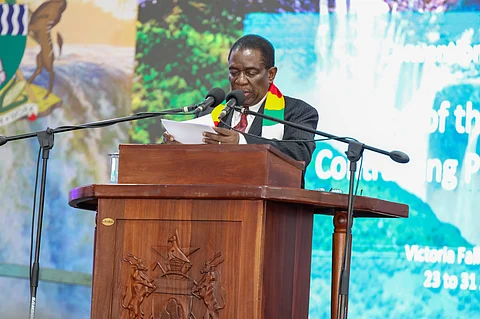

Ramsar COP15 runs from July 23-31 in Victoria Falls, Zimbabwe
3,000+ delegates from 172 countries attending the global wetlands summit
Wetlands have declined by 35 per cent since 1970 — three times faster than forests
GWO 2025 report warns 20 per cent of wetlands could vanish by 2050, costing $39 trillion
Zimbabwe assumes Ramsar presidency and launches Victoria Falls Declaration
Key agenda: Global wetland fund, integration into climate policy, 2025-34 strategy
More than 3,000 delegates from 172 countries have gathered in the Zimbabwean resort city of Victoria Falls for the week-long Ramsar Convention on Wetlands, running from July 23 to 31.
The global summit, formally known as the 15th Meeting of the Conference of the Contracting Parties to the Convention on Wetlands (COP15), brings together governments, United Nations agencies, scientists, conservation organisations and representatives of local communities to confront mounting threats to freshwater ecosystems and map a path towards sustainable management.
A key outcome of COP15 is expected to be the endorsement of the Victoria Falls Declaration, a landmark framework aimed at galvanising global efforts for wetland conservation.
Held under the theme Protecting Wetlands for Our Common Future, the event was officially opened on July 24 by Zimbabwe’s president, Emmerson Mnangagwa, who underscored the ecological, social and economic value of wetlands, describing them as indispensable to planetary health.
Mnangagwa called for urgent, collaborative measures to reverse global wetland decline, emphasising the need for innovative restoration techniques, robust policy frameworks and local engagement.
“Wetlands are among the most threatened habitats on Earth,” Mnangagwa pointed out. “They face challenges such as habitat loss and degradation due to urbanisation and development, agricultural expansion and climate change, leading to shifts in wetland distribution and altered hydrological cycles.
“Now is the time for us to change our mindsets and start implementing multi-faceted and collaborative approaches towards protecting our wetlands.”
The week-long meeting began with regional bodies convening to lay the groundwork. Ramsar Secretary General Musonda Mumba said the opening days are traditionally dedicated to preparatory meetings that give regional groups the opportunity to align priorities and consider draft resolutions.
On the first day, groups from Africa, Europe, Oceania, Asia, the Americas and the Caribbean met to begin deliberations.
Plenary sessions will later address key agenda items including the adoption of the Strategic Plan 2025-2034, progress reports on wetland restoration and the Convention’s contribution to the Sustainable Development Goals.
Delegates will also consider draft resolutions such as the establishment of a Global Wetland Restoration Fund and proposals for integrating wetlands into national climate policies.
A special edition of the Global Wetland Outlook 2025: Valuing, conserving, restoring and financing wetlands (GWO 2025) was launched during COP15, offering updated insights into the state of wetlands and practical recommendations for sustainable management. The report aims to enhance understanding of the value of wetlands and to ensure their conservation, wise use and recognition as essential ecosystems.
Wetlands are disappearing faster than any other ecosystem and this crisis is expected to dominate COP15 deliberations. Often called the “kidneys of the Earth”, wetlands filter pollutants, regulate climate and support diverse life forms.
Since 1970, global wetland coverage has declined by 35 per cent, at a rate three times faster than forest loss.
The GWO 2025 report warns that without urgent action, one-fifth of the world’s remaining wetlands could vanish by 2050, triggering massive ecological, social and economic repercussions. It estimates the potential cost of such loss at up to US$39 trillion in ecosystem services that sustain people, economies and nature.
Wetlands currently deliver ecosystem services—including clean water, food production, flood control and carbon storage—worth more than 7.5 per cent of global GDP, despite covering just 6 per cent of the Earth's surface. They also support an outsized share of jobs in agriculture, aquaculture and tourism. Yet every year, an estimated 0.52 per cent of wetlands are lost, undermining efforts to combat climate change and biodiversity loss.
“From rivers to reefs, marshes to mangroves, healthy wetlands are central to tackling the greatest challenges of our era — enhancing water and food security, reversing nature loss, mitigating and adapting to climate change and driving sustainable development. But we are continuing to drain, dredge, dam and degrade them, sacrificing their diverse and irreplaceable benefits to people, nature and climate,” said Coenraad Krijger, chief executive of Wetlands International.
Zimbabwe is taking over the three-year rotational presidency of the Ramsar Convention from China and will lead the implementation of the Victoria Falls Declaration, which aims to position wetland restoration as a central pillar of climate change mitigation.
As host of COP15, Zimbabwe is seeking to lead by example. The country is home to seven Ramsar Sites, including Victoria Falls—both a Ramsar Wetland City and a UNESCO World Heritage Site—and has been a Contracting Party to the Convention since 2013.
COP15 is expected to drive momentum behind three major shifts in wetland conservation: the adoption of the Victoria Falls Declaration, the integration of wetlands into national climate and development policies and the embrace of technological innovation.
Outcomes from the conference are anticipated to shape global wetland policy, bolster climate resilience and support biodiversity protection for generations to come.